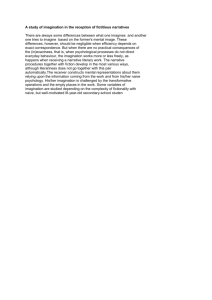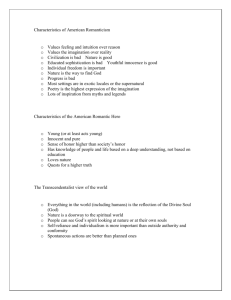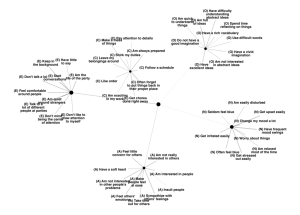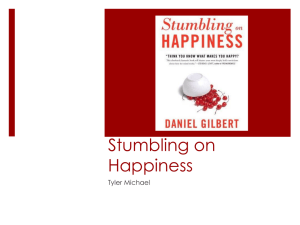Joy of being: Observation and Imagination
advertisement
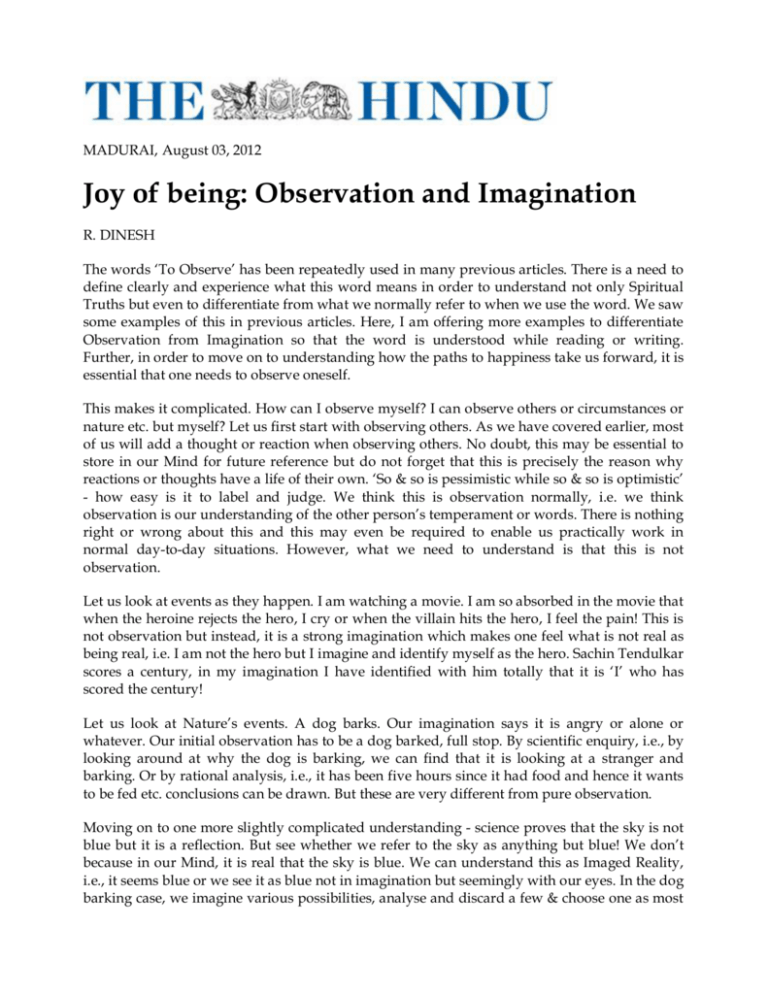
MADURAI, August 03, 2012 Joy of being: Observation and Imagination R. DINESH The words ‘To Observe’ has been repeatedly used in many previous articles. There is a need to define clearly and experience what this word means in order to understand not only Spiritual Truths but even to differentiate from what we normally refer to when we use the word. We saw some examples of this in previous articles. Here, I am offering more examples to differentiate Observation from Imagination so that the word is understood while reading or writing. Further, in order to move on to understanding how the paths to happiness take us forward, it is essential that one needs to observe oneself. This makes it complicated. How can I observe myself? I can observe others or circumstances or nature etc. but myself? Let us first start with observing others. As we have covered earlier, most of us will add a thought or reaction when observing others. No doubt, this may be essential to store in our Mind for future reference but do not forget that this is precisely the reason why reactions or thoughts have a life of their own. ‘So & so is pessimistic while so & so is optimistic’ - how easy is it to label and judge. We think this is observation normally, i.e. we think observation is our understanding of the other person’s temperament or words. There is nothing right or wrong about this and this may even be required to enable us practically work in normal day-to-day situations. However, what we need to understand is that this is not observation. Let us look at events as they happen. I am watching a movie. I am so absorbed in the movie that when the heroine rejects the hero, I cry or when the villain hits the hero, I feel the pain! This is not observation but instead, it is a strong imagination which makes one feel what is not real as being real, i.e. I am not the hero but I imagine and identify myself as the hero. Sachin Tendulkar scores a century, in my imagination I have identified with him totally that it is ‘I’ who has scored the century! Let us look at Nature’s events. A dog barks. Our imagination says it is angry or alone or whatever. Our initial observation has to be a dog barked, full stop. By scientific enquiry, i.e., by looking around at why the dog is barking, we can find that it is looking at a stranger and barking. Or by rational analysis, i.e., it has been five hours since it had food and hence it wants to be fed etc. conclusions can be drawn. But these are very different from pure observation. Moving on to one more slightly complicated understanding - science proves that the sky is not blue but it is a reflection. But see whether we refer to the sky as anything but blue! We don’t because in our Mind, it is real that the sky is blue. We can understand this as Imaged Reality, i.e., it seems blue or we see it as blue not in imagination but seemingly with our eyes. In the dog barking case, we imagine various possibilities, analyse and discard a few & choose one as most probable. This is not an observation, neither is seeing the sky as blue or using some other word for describing the sky. One needs to understand there are different layers in the Mind. The earlier examples we saw of use of our intelligence or analysis or even scientific enquiry are all experienced (or done) by different layers of the Mind. They are needed and very much required but not the observation we are speaking of now. Even intuition and ability to read others’ minds etc. are all different facets of the Mind but they are not observation. Normally, the Mind keeps shifting between these layers i.e., thoughts are incessant and it will be sometimes focused and concentrated. When there is sharp clarity in our thinking and the labels and judgments are made clearly by the intelligent focused Mind we term it as Observation many times. However, this is not what real Observation is all about. Science proves experiments by isolating and concentrating on a specific activity. If this is stretched, all activity of the Mind has to be ‘observed;’ then the identification we have with our Mind has to be dropped. The examples we saw in earlier articles have to be experienced, i.e., the Mind thinks, the body pains and emotions are arising, not ‘I’ think. This means, one’s identity with our thoughts and emotions drop. Even one’s identity with one’s name, body etc. drop. This naturally means one does not associate others as being connected to one i.e., ‘My’ children, ‘My’ company etc. are not real anymore. A pertinent question is ‘who observes’? At the Highest level, one becomes identified with the silent witness consciousness (which is the Self). However, most times, it will be the highest part of our Mind. Also, the thoughts, comments, analysis would continue to arise but refusal to identify will result in this being observed as well. As and when an interval arises between these comments, the true observation will take place i.e., what is happening at that time will be observed and not what one thinks will be seen as reality. There will not be any value judgment put on what has been observed, instead the senses will smell, taste and most importantly see and hear all events and happenings in full earnestness without losing anything in the Mind’s absorption with its thoughts and commentaries. This can be termed as completely living in the present or the ‘Now’ in Eckhart Tolles words. This also does not mean one rejects the senses or their perception; only there is no identification and obsession with what effect they produce in our Mind. The next question which then arises is why should one ‘observe’ with so much difficulty and problems (moving away from thoughts) and also what happens when one observes. One will find that when one observes (even if only for a few seconds initially), we will feel a happiness which is more stronger and intense than anything one feels when the senses feel satisfied or one’s desires are met. The intensity will be more than what one feels when a highly cherished desire is achieved or when tasting the best food item or when many aspirations which one may have are achieved successfully. The more deeper one’s observation is, i.e., the deeper one goes the more happiness one will feel. As seen earlier, relaxed attention itself gives one an inkling of how happy one can feel when observing. Now the reverse also is true, i.e., one cannot be happy unless one relaxes – one can be truly happy only when one observes. This is the reason why observing becomes a practice one must cultivate. Due to our pre-occupation with the Mind, most of the time we are imagining things. Now what we think we see or observe is many times an imagined or at best an imaged reality. Therefore, instead of even logically understanding facts or matters as done by science, we complicate life by thinking our interpretation of things or possibilities is the Truth. By itself, imagining things may not matter but we confuse what is imagined as the truth and then cause problems to arise because of that. To compound the problem even without being conscious that what we think we are seeing /feeling is not real, we give a place for what we term as imagination! Even this imagination has its repercussions and they create their own habits. Many of us would have noticed a few persons would refuse to accept reality or what is clearly visible to others as facts. We would then label such persons as dreamers who live in their own world of imagination. The fact is all of us are equally living in our imaged reality and refuse to observe the Truth behind the Imaged reality. Also we tend to imagine possibilities or interpret facts based upon one’s tendencies without observing the facts first. Let us see a few examples – in the business world, facts become the reality. See how many of us do business without seeing or refusing to accept facts. In India, if you deposit money in a bank you will get say 10 to 11 per cent as interest. In a business (which one owns or puts money in) should not the return be higher? Do we measure and take all our decisions based on this? Those who do at least seem to follow the normal surface reality. Those who don’t will justify based on ones emotional linking with the business activity! I will give another example; in my personal life where I have learnt sharply how to understand and experience the usefulness of ‘Observation’ and the effect it produces. I have recently started to learn swimming. First I refused to accept the reality that one can float in water! Why? – due to imagined fears! Continuing this I now realize (may be due to the age factor) that I cannot learn unless my Mind exclusively concentrates on the task at hand. I can now routinely observe that irrespective of how well performed the task, the very fact of exclusive attention and surrendering to the water (overcoming one’s fears) makes me happy at the end of the session. I am also equally sure that once I learn (if I complete), the actions will become routine and no more will exclusive attention arise and therefore no happiness at the end of it! By surface observation, we can see that even when a difficult or any other task requiring exclusive attention is performed, the first flush of happiness one feels arising is due to the fact that one surrendered to the task at hand and there were very few thoughts distracting one. We can see thousands of examples which explain the usefulness of observation and the effect it produces. However, the principle is the same. Meditation is seen as the route to achieve ‘observer status’ and as in the swimming example given in the previous article, if one meditates on a word, after sometime that will become routine. That is why watching one’s breath is seen as the ideal method as this requires total attention. It may be true that one cannot or may not be able to reach that stage of attention always but that is immaterial. One is not able to coordinate hand and feet movement when swimming or one does badly a particular task because one is pre-occupied with other things, this does not mean it will be so always or that one should stop trying because of few failures. Thus, we can understand that ‘to observe’ means, one would be ‘happy’ at the end and even during the period of ‘observation’. This ‘observation’ could be of an activity or even listening to somebody (with utter concentration) or even complete focus on a particular goal. The test of whether one is observing or not is how one feels at the end of the period (during the period one would not notice how one feels). Imagining something very nice will enable one feel pleasant during the process and may be for a few minutes later but soon reality will take over one’s dream state and bring one down to earth and one may even feel let down and not happy at the end of the imagined period. Nowadays medical science says the older one gets one must learn new things so that the brain gets exercised, I am sure there will be research papers later which show that this results in the ‘happiness’ side of the brain being activated and this would be due to the fact that exclusive attention and therefore non-identification with the outcome or effort actually happened during that period In summary, practical life has got to be data based and bereft of subjectivity (when it comes to business or the material world). Emotions colour the subjectivity but are a strong motive for pursuing different experiences. Therefore, rather than imagining a reality which while seemingly visible (like the blue sky) is either an Imaged Reality or pure imagination (in the normal definition of the same) one needs to pursue observation. Imagination has its place but we cannot and should not mistake that for reality. Dreams cause one to experience almost as if it was real. One can wake up from a dream scared or joyful as much as if one had experienced the same while in the wakeful state. Thus one’s Mind lives a dream through its imagination. The problem is that the same Mind thinks of that (because of its past conditioning) as reality and this disrupts our natural state of happiness. The true test as to whether one is observing or not is how happy one feels at the end of a task or period and the intensity of the observation will determine how happy one feels. The more one pursues ‘observation’, the more happiness one will have as all of life’s experiences would be viewed in the correct and true perspective. We will see later how the various paths of work, devotion and knowledge actually are based on the bedrock of the right perspective of the Truth. Rather than be confused with various definitions or words, it is enough if one correlates every experience of calm happiness one has had or attempt to achieve that in our everyday actions or through practices like meditation so that we can correlate what ‘observation’ really means and link it with ‘True Happiness’. When the practise becomes ingrained and the identification with the Imagination or Imaged reality drops away, ultimately nothing but Happiness will remain.
